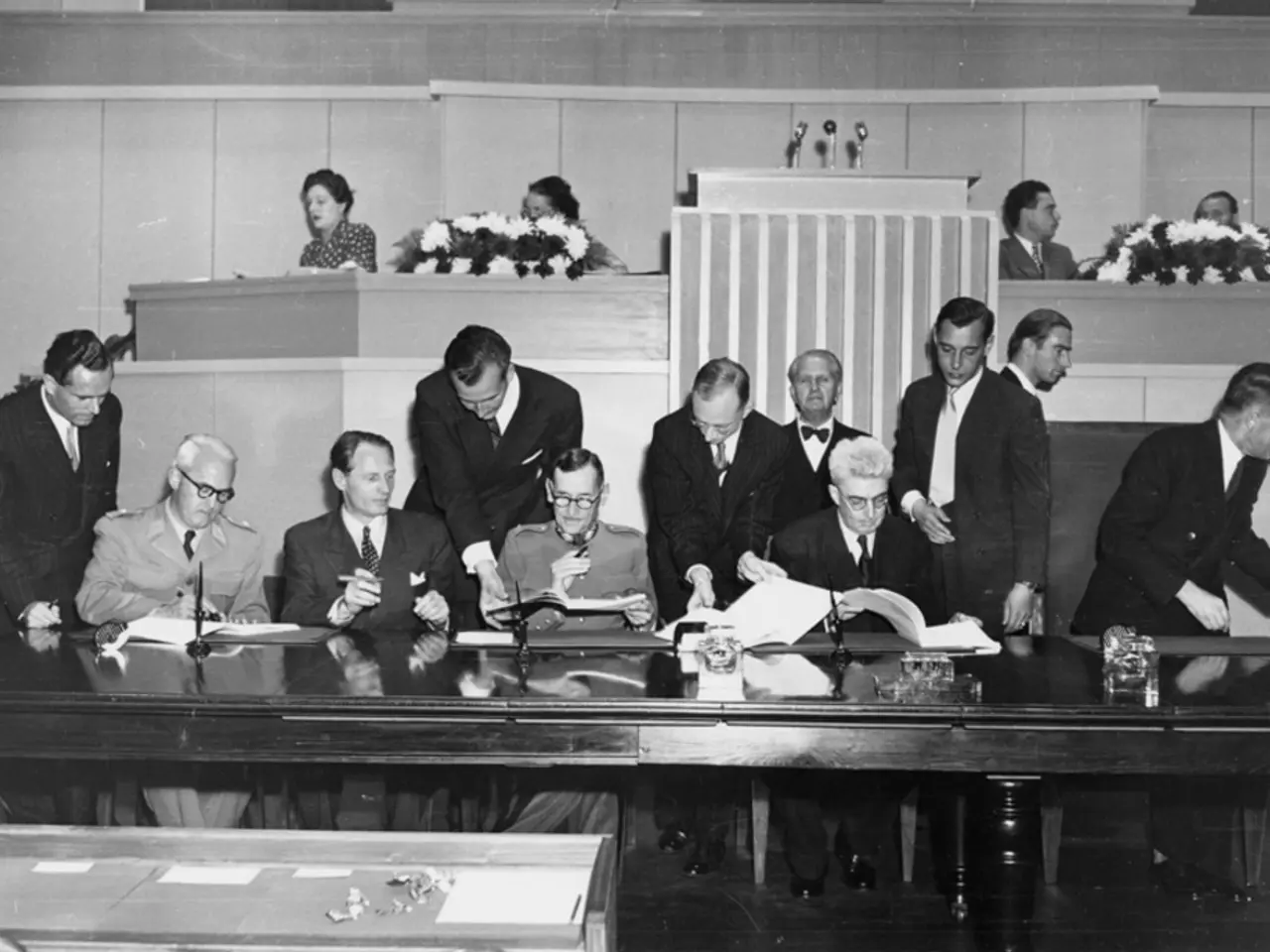"Indian Ministry of External Affairs Endorses Rights to Airspace Traversal and Legal Trade in South China Sea"
India, Philippines Strengthen Ties and Stance on South China Sea
In the complex geopolitical landscape of the South China Sea, India and the Philippines have been forging closer ties, aligning their positions on key issues, and bolstering their naval cooperation.
India views the South China Sea as part of the "global commons" and bases its stance on the 1982 United Nations Convention on the Law of the Sea (UNCLOS). The country champions the rules-based international order, supports freedom of navigation, and advocates for peaceful resolution of disputes in accordance with international law. India is not a claimant in the South China Sea, but it has expressed concern over coercive and aggressive actions that threaten peace and stability in the region.
Recently, India and the Philippines participated in a joint naval exercise in Southeast Asia, reinforcing their commitment to regional security and cooperation. The nations have also agreed to deepen their cooperation under the ASEAN-India Joint Statement on Cooperation on the ASEAN Outlook on the Indo-Pacific, aiming to promote peace, stability, and prosperity in the region.
The Philippines, on the other hand, maintains a strong position anchored in the 2016 arbitral tribunal ruling under UNCLOS, which invalidated much of China’s expansive claims. The country has been vocal about China’s destabilizing actions and condemns harassment of Philippine vessels near disputed features. The Philippines calls on China to abide by the ruling and respects multilateral dispute mechanisms. It also pursues defense cooperation with allies like the U.S. and Japan to balance China's pressure.
Both nations have expressed interest in greater participation in multilateral maritime exercises, including the ASEAN-India Maritime Exercise, India's Exercise MILAN, and the Philippines' Maritime Cooperative Activities. They have also recognized the crucial role of the seas and oceans in supporting their development goals and shared challenges on maritime security as coastal and maritime nations in the Indo-Pacific.
The countries have exchanged views on regional maritime challenges, committed to sharing best practices, and pledged to enhance cooperation between maritime agencies and institutions for the peaceful and sustainable use of marine resources. They have also reiterated their shared commitment to working together on issues concerning the Global South, including through continued cooperation in the Voice of the Global South Summit (VOGSS).
In a significant development, India and the Philippines have not made any statements regarding their stance on the Code of Conduct (CoC) in the South China Sea. However, India's Secretary (East), Periasamy Kumaran, stated that discussions on the CoC should be effective, substantive, and inclusive of the interests of all stakeholders.
China's stance on the South China Sea is assertive and uncompromising. China claims nearly the entire South China Sea by historical rights, rejecting international arbitration rulings unfavorable to it and interpreting UNCLOS in a way to exclude territorial sovereignty disputes from its dispute settlement mechanism. China emphasizes bilateral negotiations over multilateral or legal adjudications, dismissing the 2016 arbitral tribunal ruling initiated by the Philippines as illegitimate and unlawful.
In a recent statement, China's People's Liberation Army's Southern Theatre Command called out the Philippines for organising "joint patrols" with "external countries", noting that these exercises undermine regional peace and stability.
India supports freedom of navigation, overflight, and legitimate commerce through the South China Sea. The Prime Minister of India reaffirmed this stance, stating, "We support the freedom of navigation based on international law." Any disputes in the South China Sea should be resolved peacefully, without the threat or use of force, and through legal and diplomatic means.
In conclusion, while China maintains maximalist claims and rejects constraints perceived to limit its sovereignty, including aspects of freedom of navigation and UNCLOS provisions it deems inapplicable to territorial sovereignty, India and the Philippines emphasize a rules-based order supporting UNCLOS and freedom of navigation, bolstering a strategic presence to balance China’s dominance without direct involvement in claimant disputes.
- India and the Philippines, in their shared stance on the South China Sea, enjoy a policy and legislation alignment that advocates for a rules-based order, based on the United Nations Convention on the Law of the Sea (UNCLOS), and supports freedom of navigation.
- In the realm of general news, both India and the Philippines continue to follow politics closely, cooperating on maritime security initiatives and calling for peaceful resolution of disputes, while advocating against coercive and aggressive actions that threaten peace and stability in the South China Sea.








